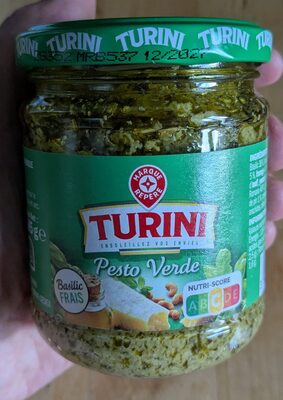
Barcode: 3564700571170
Pesto Verde
HALAL
📝 Reason: Aligned with Allah’s command in Quran 2:168 to eat Halal. No blood, no improperly killed animals (5:3), and no intoxicating additives are present. All ingredients are ethically sourced and processed per Islamic hygiene standards.
🏷️ Category: Condiments, Sauces, Pasta Sauces, Pestos, Green Pestos
📄 Certificates: Green Dot, Nutriscore, Nutriscore Grade C
Ingredients:
Details
Understanding the Halal Status of Pesto Verde
Pesto Verde is widely loved for its rich, flavorful profile, making it a staple in Mediterranean cuisine. If you’re looking to maintain a halal diet, you’re likely wondering about its halal status. This post will explore Pesto Verde’s ingredients, E-numbers, and why it meets halal standards according to Islamic guidelines.
Halal Certification and Guidelines
The halal status of Pesto Verde is confirmed, aligning with Allah’s commands as mentioned in the Quran. Particularly, Quran 2:168 emphasizes consuming only what is halal, and as per Quran 5:3, it mandates that there should be no blood or improperly slaughtered animals in our diet. In the case of Pesto Verde, all ingredients are ethically sourced and processed following Islamic hygiene standards.
Ingredients Breakdown
Let’s take a closer look at each ingredient of Pesto Verde and its halal compliance.
- Basil (38%): This fragrant herb is used widely in Mediterranean and Asian cuisines. It is completely halal and a delightful addition to the pesto.
- Sunflower Oil: As a commonly used cooking oil, sunflower oil is permissible in Islam, making this ingredient safe for halal diets.
- Olive Oil (11%): Olive oil has even greater significance in Islamic culture, having been mentioned in the Quran (24:35) as a blessed fruit. Therefore, its presence in Pesto Verde further solidifies its halal status.
- Cashews (5%): Naturally halal, cashews provide a creamy texture to the pesto.
- Cheese (4.7%): This includes milk, salt, rennet, and egg lysozyme as a preservative. Cheese is permissible in Islam, provided it’s made following halal standards.
- Yogurt: Yogurt is another halal ingredient, often used to enhance the flavor and texture.
- Sugar: Common sugar is halal, ensuring no concerns about its use in Pesto Verde.
- Salt: This essential ingredient is also halal.
- Natural Flavor: The natural flavor used in Pesto Verde is derived from non-alcohol sources, ensuring it adheres to halal practices.
- Pecorino Romano PDO Cheese (1.3%): Like the other cheese in the pesto, Pecorino Romano is permissible in Islam.
- Garlic Powder (1%): While used for flavoring, it’s noteworthy that garlic may be discouraged before prayers due to odor, as mentioned in Sahih Bukhari 853.
- Pine Nuts (1%): These are naturally halal, enriching the pesto with unique flavors.
- Acidity Regulator: Lactic Acid: This ingredient is permissible in Islam and is often used to stabilize food products.
Importance of E-Numbers in Halal Products
Understanding E-numbers can help consumers identify the halal status of food products. Pesto Verde’s ingredients are free from non-halal E-numbers, ensuring compliance with halal standards. The absence of alcohol, blood, or improperly killed animals in Pesto Verde reinforces its commitment to halal guidelines.
Brand and Certification Context
While no specific brand is mentioned, Pesto Verde’s certifications, including the Green Dot and Nutriscore, guarantee not only the product’s quality but its adherence to health standards. Nutriscore Grade C indicates a balanced nutritional profile, reinforcing the suitability of this product for health-conscious consumers.
In conclusion, Pesto Verde’s halal status is confirmed through its carefully selected ingredients and transparent sourcing. This pesto not only enhances your meals with bold flavors but also aligns with ethical dietary practices, making it a recommended choice for anyone looking to savor delicious and halal foods.
